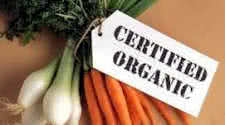Are Certified Organic Foods Better for you than Regular Food?

Understanding the Advantages of Consuming Organic Foods Daily
If you've ever wondered what advantages, if any, certified organic foods have over regular foods and if they are actually worth the extra
cost you are not alone.
Bodybuilders are remarkably dedicated to eating the right foods at the right times, but they should also be aware that the massive amounts
of food they are ingesting could have an impact on their health - now or in the future. Including organic foods in a bodybuilding diet may
be part of the solution.
The term "organic" can apply to many types of foods. You might think of vegetables immediately, but organic versions of meats, dairy, grains,
spices and even coffee are also available. The United States Department of Agriculture (USDA) made it even easier to identify foods that are
truly organic when it adopted new labeling rules in back in December of the year 2000. If you purchase a food product labeled "100% organic,"
you can be assured that it:
» came from USDA-certified farms or ranches
» was not grown with synthetic pesticides or fertilizers or with sewage sludge
» was not biotechnically altered or irradiated
» does not contain hormones or antibiotics.
There are good motivations to buy organic food - environmental (fewer toxic chemicals leaching into soil and streams, for example); ethical,
humane or social (animals have to have outdoor access, for example); and health. But the necessity of eating organic foods for health reasons
is complex and unproved. Not only that, buying organic food can put a serious dent in your wallet. We found the accompanying prices for organic
foods at a Los Angeles-area Whole Foods Market, a nationwide health food and grocery chain, and compared them with prices for regular products
at a supermarket chain.
Obviously, nobody wants to spend extra money unless they know they are getting better-quality food, and only the wealthiest bodybuilders are
likely to have the financial means to switch to an all-organic diet. So, what is the most effective way to incorporate organic food into your
diet? According to top experts in the field, bodybuilders should consider buying organic meats, poultry and fish. They contain no antibiotics
or hormones, which can be especially detrimental to making size gains, particularly when they're consumed in great quantities and over long
periods of time.
The second area to focus on is specific varieties of produce. Dr. Andrew Weil, renowned health and alternative medicine expert, says that some
crops are more likely to carry pesticide residue, including strawberries, peaches, apricots, cherries, grapes from Chile, cantaloupes from
Mexico, green beans, celery and spinach. Follow safe-handling rules, and rinse, scrub or peel fruits and vegetables.
Although the long-term positive health and bodybuilding effects of using organic food have not been proved, switching to them to the degree
possible might be beneficial. Organic foods are, by their nature, cleaner and "simpler": a positive addition to any bodybuilder's diet. For
instance, you aren't likely to find frozen organic pizza bagels or other junk-food items. Companies that produce organic items tend to be concerned
about using ; quality ingredients, avoiding synthetic chemicals, including fewer preservatives and using less sodium. In addition, the potential
psychological benefits of knowing you are eating cleaner should not be overlooked.